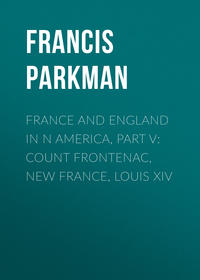 полная версия
полная версияFrance and England in North America, Part I: Pioneers of France in the New World
On the twenty eighth of August, the two captains Vasseur and Verdier came in with tidings of an approaching squadron. Again the fort was wild with excitement. Friends or foes, French or Spaniards, succor or death,—betwixt these were their hopes and fears divided. On the following morning, they saw seven barges rowing up the river, bristling with weapons, and crowded with men in armor. The sentries on the bluff challenged, and received no answer. One of them fired at the advancing boats, and still there was no response. Laudonniere was almost defenceless. He had given his heavier cannon to Hawkins, and only two field-pieces were left. They were levelled at the foremost boats, and the word to fire was about to be given, when a voice from among the strangers called out that they were French, commanded by Jean Ribaut.
At the eleventh hour, the long looked for succors were come. Ribaut had been commissioned to sail with seven ships for Florida. A disorderly concourse of disbanded soldiers, mixed with artisans and their families, and young nobles weary of a two years' peace, were mustered at the port of Dieppe, and embarked, to the number of three hundred men, bearing with them all things thought necessary to a prosperous colony.
No longer in dread of the Spaniards, the colonists saluted the new-comers with the cannon by which a moment before they had hoped to blow them out of the water. Laudonniere issued from his stronghold to welcome them, and regaled them with what cheer he could. Ribaut was present, conspicuous by his long beard, an astonishment to the Indians; and here, too, were officers, old friends of Laudonniere. Why, then, had they approached in the attitude of enemies? The mystery was soon explained; for they expressed to the commandant their pleasure at finding that the charges made against him had proved false. He begged to know more; on which Ribaut, taking him aside, told him that the returning ships had brought home letters filled with accusations of arrogance, tyranny, cruelty, and a purpose of establishing an independent command,—accusations which he now saw to be unfounded, but which had been the occasion of his unusual and startling precaution. He gave him, too, a letter from Admiral Coligny. In brief but courteous terms, it required him to resign his command, and requested his return to France to clear his name from the imputations cast upon it. Ribaut warmly urged him to remain; but Laudonniere declined his friendly proposals.
Worn in body and mind, mortified and wounded, he soon fell ill again. A peasant woman attended him, who was brought over, he says, to nurse the sick and take charge of the poultry, and of whom Le Moyne also speaks as a servant, but who had been made the occasion of additional charges against him, most offensive to the austere Admiral.
Stores were landed, tents were pitched, women and children were sent on shore, feathered Indians mingled in the throng, and the borders of the River of May swarmed with busy life. "But, lo, how oftentimes misfortune doth search and pursue us, even then when we thinke to be at rest!" exclaims the unhappy Laudonniere. Amidst the light and cheer of renovated hope, a cloud of blackest omen was gathering in the east.
At half-past eleven on the night of Tuesday, the fourth of September, the crew of Ribaut's flag-ship, anchored on the still sea outside the bar, saw a huge hulk, grim with the throats of cannon, drifting towards them through the gloom; and from its stern rolled on the sluggish air the portentous banner of Spain.
CHAPTER VII
1565
MENENDEZ.
The monk, the inquisitor, and the Jesuit were lords of Spain,—sovereigns of her sovereign, for they had formed the dark and narrow mind of that tyrannical recluse. They had formed the minds of her people, quenched in blood every spark of rising heresy, and given over a noble nation to a bigotry blind and inexorable as the doom of fate. Linked with pride, ambition, avarice, every passion of a rich, strong nature, potent for good and ill, it made the Spaniard of that day a scourge as dire as ever fell on man.
Day was breaking on the world. Light, hope, and freedom pierced with vitalizing ray the clouds and the miasma that hung so thick over the prostrate Middle Age, once noble and mighty, now a foul image of decay and death. Kindled with new life, the nations gave birth to a progeny of heroes, and the stormy glories of the sixteenth century rose on awakened Europe. But Spain was the citadel of darkness,—a monastic cell, an inquisitorial dungeon, where no ray could pierce. She was the bulwark of the Church, against whose adamantine wall the waves of innovation beat in vain.19 In every country of Europe the party of freedom and reform was the national party, the party of reaction and absolutism was the Spanish party, leaning on Spain, looking to her for help. Above all, it was so in France; and, while within her bounds there was for a time some semblance of peace, the national and religious rage burst forth on a wilder theatre. Thither it is for us to follow it, where, on the shores of Florida, the Spaniard and the Frenchman, the bigot and the Huguenot, met in the grapple of death.
In a corridor of his palace, Philip the Second was met by a man who had long stood waiting his approach, and who with proud reverence placed a petition in the hand of the pale and sombre King.
The petitioner was Pedro Menendez de Aviles, one of the ablest and most distinguished officers of the Spanish marine. He was born of an ancient Asturian family. His boyhood had been wayward, ungovernable, and fierce. He ran off at eight years of age, and when, after a search of six months, he was found and brought back, he ran off again. This time he was more successful, escaping on board a fleet bound against the Barbary corsairs, where his precocious appetite for blood and blows had reasonable contentment. A few years later, he found means to build a small vessel, in which he cruised against the corsairs and the French, and, though still hardly more than a boy, displayed a singular address and daring. The wonders of the New World now seized his imagination. He made a voyage thither, and the ships under his charge came back freighted with wealth. The war with France was then at its height. As captain-general of the fleet, he was sent with troops to Flanders; and to their prompt arrival was due, it is said, the victory of St. Quentin. Two years later, he commanded the luckless armada which bore back Philip to his native shore. On the way, the King narrowly escaped drowning in a storm off the port of Laredo. This mischance, or his own violence and insubordination, wrought to the prejudice of Menendez. He complained that his services were ill repaid. Philip lent him a favoring ear, and despatched him to the Indies as general of the fleet and army. Here he found means to amass vast riches; and, in 1561, on his return to Spain, charges were brought against him of a nature which his too friendly biographer does not explain. The Council of the Indies arrested him. He was imprisoned and sentenced to a heavy fine; but, gaining his release, hastened to court to throw himself on the royal clemency. His petition was most graciously received. Philip restored his command, but remitted only half his fine, a strong presumption of his guilt.
Menendez kissed the royal hand; he had another petition in reserve. His son had been wrecked near the Bermudas, and he would fain go thither to find tidings of his fate. The pious King bade him trust in God, and promised that he should be despatched without delay to the Bermudas and to Florida, with a commission to make an exact survey of the neighboring seas for the profit of future voyagers; but Menendez was not content with such an errand. He knew, he said, nothing of greater moment to his Majesty than the conquest and settlement of Florida. The climate was healthful, the soil fertile; and, worldly advantages aside, it was peopled by a race sunk in the thickest shades of infidelity. "Such grief," he pursued, "seizes me, when I behold this multitude of wretched Indians, that I should choose the conquest and settling of Florida above all commands, offices, and dignities which your Majesty might bestow." Those who take this for hypocrisy do not know the Spaniard of the sixteenth century.
The King was edified by his zeal. An enterprise of such spiritual and temporal promise was not to be slighted, and Menendez was empowered to conquer and convert Florida at his own cost. The conquest was to be effected within three years. Menendez was to take with him five hundred men, and supply them with five hundred slaves, besides horses, cattle, sheep, and hogs. Villages were to be built, with forts to defend them, and sixteen ecclesiastics, of whom four should be Jesuits, were to form the nucleus of a Floridan church. The King, on his part, granted Menendez free trade with Hispaniola, Porto Rico, Cuba, and Spain, the office of Adelantado of Florida for life, with the right of naming his successor, and large emoluments to be drawn from the expected conquest.
The compact struck, Menendez hastened to his native Asturias to raise money among his relatives. Scarcely was he gone, when tidings reached Madrid that Florida was already occupied by a colony of French Protestants, and that a reinforcement, under Ribaut, was on the point of sailing thither. A French historian of high authority declares that these advices came from the Catholic party at the French court, in whom every instinct of patriotism was lost in their hatred of Coligny and the Huguenots. Of this there can be little doubt, though information also came about this time from the buccaneer Frenchmen captured in the West Indies.
Foreigners had invaded the territory of Spain. The trespassers, too, were heretics, foes of God, and liegemen of the Devil. Their doom was fixed. But how would France endure an assault, in time of peace, on subjects who had gone forth on an enterprise sanctioned by the Crown, and undertaken in its name and under its commission?
The throne of France, in which the corruption of the nation seemed gathered to a head, was trembling between the two parties of the Catholics and the Huguenots, whose chiefs aimed at royalty. Flattering both, caressing both, playing one against the other, and betraying both, Catherine de Medicis, by a thousand crafty arts and expedients of the moment, sought to retain the crown on the head of her weak and vicious son. Of late her crooked policy had led her towards the Catholic party, in other words the party of Spain; and she had already given ear to the savage Duke of Alva, urging her to the course which, seven years later, led to the carnage of St. Bartholomew. In short, the Spanish policy was in the ascendant, and no thought of the national interest or honor could restrain that basest of courts from abandoning by hundreds to the national enemy those whom it was itself meditating to immolate by thousands. It might protest for form's sake, or to quiet public clamor; but Philip of Spain well knew that it would end in patient submission.
Menendez was summoned back in haste to the Spanish court. His force must be strengthened. Three hundred and ninety-four men were added at the royal charge, and a corresponding number of transport and supply ships. It was a holy war, a crusade, and as such was preached by priest and monk along the western coasts of Spain. All the Biscayan ports flamed with zeal, and adventurers crowded to enroll themselves; since to plunder heretics is good for the soul as well as the purse, and broil and massacre have double attraction when promoted into a means of salvation. It was a fervor, deep and hot, but not of celestial kindling; nor yet that buoyant and inspiring zeal which, when the Middle Age was in its youth and prime, glowed in the souls of Tancred, Godfrey, and St. Louis, and which, when its day was long since past, could still find its home in the great heart of Columbus. A darker spirit urged the new crusade,—born not of hope, but of fear, slavish in its nature, the creature and the tool of despotism; for the typical Spaniard of the sixteenth century was not in strictness a fanatic, he was bigotry incarnate.
Heresy was a plague-spot, an ulcer to be eradicated with fire and the knife, and this foul abomination was infecting the shores which the Vicegerent of Christ had given to the King of Spain, and which the Most Catholic King had given to the Adelantado. Thus would countless heathen tribes be doomed to an eternity of flame, and the Prince of Darkness hold his ancient sway unbroken; and for the Adelantado himself, the vast outlays, the vast debts of his bold Floridan venture would be all in vain, and his fortunes be wrecked past redemption through these tools of Satan. As a Catholic, as a Spaniard, and as an adventurer, his course was clear.
The work assigned him was prodigious. He was invested with power almost absolute, not merely over the peninsula which now retains the name of Florida, but over all North America, from Labrador to Mexico; for this was the Florida of the old Spanish geographers, and the Florida designated in the commission of Menendez. It was a continent which he was to conquer and occupy out of his own purse. The impoverished King contracted with his daring and ambitious subject to win and hold for him the territory of the future United States and British Provinces. His plan, as afterwards exposed at length in his letters to Philip the Second, was, first, to plant a garrison at Port Royal, and next to fortify strongly on Chesapeake Bay, called by him St. Mary's. He believed that adjoining this bay was an arm of the sea, running northward and eastward, and communicating with the Gulf of St. Lawrence, thus making New England, with adjacent districts, an island. His proposed fort on the Chesapeake, securing access by this imaginary passage, to the seas of Newfoundland, would enable the Spaniards to command the fisheries, on which both the French and the English had long encroached, to the great prejudice of Spanish rights. Doubtless, too, these inland waters gave access to the South Sea, and their occupation was necessary to prevent the French from penetrating thither; for that ambitious people, since the time of Cartier, had never abandoned their schemes of seizing this portion of the dominions of the King of Spain. Five hundred soldiers and one hundred sailors must, he urges, take possession, without delay, of Port Royal and the Chesapeake.20
Preparation for his enterprise was pushed with furious energy. His whole force, when the several squadrons were united, amounted to two thousand six hundred and forty-six persons, in thirty-four vessels, one of which, the San Pelayo, bearing Menendez himself, was of nine hundred and ninety-six tons burden, and is described as one of the finest ships afloat.21 There were twelve Franciscans and eight Jesuits, besides other ecclesiastics; and many knights of Galicia, Biscay, and the Asturias took part in the expedition. With a slight exception, the whole was at the Adelantado's charge. Within the first fourteen months, according to his admirer, Barcia, the adventure cost him a million ducats.22
Before the close of the year, Sancho do Arciniega was commissioned to join Menendez with an additional force of fifteen hundred men.
Red-hot with a determined purpose, the Adelantado would brook no delay. To him, says the chronicler, every day seemed a year. He was eager to anticipate Ribaut, of whose designs and whose force he seems to have been informed to the minutest particular, but whom he hoped to thwart and ruin by gaining Fort Caroline before him. With eleven ships, therefore, he sailed from Cadiz, on the twenty-ninth of June, 1565, leaving the smaller vessels of his fleet to follow with what speed they might. He touched first at the Canaries, and on the eighth of July left them, steering for Dominica. A minute account of the voyage has come down to us, written by Mendoza, chaplain of the expedition,—a somewhat dull and illiterate person, who busily jots down the incidents of each passing day, and is constantly betraying, with a certain awkward simplicity, how the cares of this world and of the next jostle each other in his thoughts.
On Friday, the twentieth of July, a storm fell upon them with appalling fury. The pilots lost their wits, and the sailors gave themselves up to their terrors. Throughout the night, they beset Mendoza for confession and absolution, a boon not easily granted, for the seas swept the crowded decks with cataracts of foam, and the shriekings of the gale in the rigging overpowered the exhortations of the half-drowned priest. Cannon, cables, spars, water-casks, were thrown overboard, and the chests of the sailors would have followed, had not the latter, in spite of their fright, raised such a howl of remonstrance that the order was revoked. At length day dawned, Plunging, reeling, half under water, quivering with the shock of the seas, whose mountain ridges rolled down upon her before the gale, the ship lay in deadly peril from Friday till Monday noon. Then the storm abated; the sun broke out; and again she held her course.
They reached Dominica on Sunday, the fifth of August. The chaplain tells us how he went on shore to refresh himself; how, while his Italian servant washed his linen at a brook, he strolled along the beach and picked up shells; and how he was scared, first, by a prodigious turtle, and next by a vision of the cannibal natives, which caused his prompt retreat to the boats.
On the tenth, they anchored in the harbor of Porto Rico, where they found two ships of their squadron, from which they had parted in the storm. One of them was the "San Pelayo," with Menendez on board. Mendoza informs us, that in the evening the officers came on board the ship to which he was attached, when he, the chaplain, regaled them with sweetmeats, and that Menendez invited him not only to supper that night, but to dinner the next day, "for the which I thanked him, as reason was," says the gratified churchman.
Here thirty men deserted, and three priests also ran off, of which Mendoza bitterly complains, as increasing his own work. The motives of the clerical truants may perhaps be inferred from a worldly temptation to which the chaplain himself was subjected. "I was offered the service of a chapel where I should have got a peso for every mass I said, the whole year round; but I did not accept it, for fear that what I hear said of the other three would be said of me. Besides, it is not a place where one can hope for any great advancement, and I wished to try whether, in refusing a benefice for the love of the Lord, He will not repay me with some other stroke of fortune before the end of the voyage; for it is my aim to serve God and His blessed Mother."
The original design had been to rendezvous at Havana, but with the Adelantado the advantages of despatch outweighed every other consideration. He resolved to push directly for Florida. Five of his scattered ships had by this time rejoined company, comprising, exclusive of officers, a force of about five hundred soldiers, two hundred sailors, and one hundred colonists. Bearing northward, he advanced by an unknown and dangerous course along the coast of Hayti and through the intricate passes of the Bahamas. On the night of the twenty-sixth, the "San Pelayo" struck three times on the shoals; "but," says the chaplain, "inasmuch as our enterprise was undertaken for the sake of Christ and His blessed Mother, two heavy seas struck her abaft, and set her afloat again."
At length the ships lay becalmed in the Bahama Channel, slumbering on the glassy sea, torpid with the heats of a West Indian August. Menendez called a council of the commanders. There was doubt and indecision. Perhaps Ribaut had already reached the French fort, and then to attack the united force would be an act of desperation. Far better to await their lagging comrades. But the Adelantado was of another mind; and, even had his enemy arrived, ho was resolved that he should have no time to fortify himself.
"It is God's will," he said, "that our victory should be due, not to our numbers, but to His all-powerful aid. Therefore has He stricken us with tempests, and scattered our ships." And he gave his voice for instant advance.
There was much dispute; even the chaplain remonstrated; but nothing could bend the iron will of Menendez. Nor was a sign of celestial approval wanting. At nine in the evening, a great meteor burst forth in mid-heaven, and, blazing like the sun, rolled westward towards the coast of Florida. The fainting spirits of the crusaders were revived. Diligent preparation was begun. Prayers and masses were said; and, that the temporal arm might not fail, the men were daily practised on deck in shooting at marks, in order, says the chronicle, that the recruits might learn not to be afraid of their guns.
The dead calm continued. "We were all very tired," says the chaplain, "and I above all, with praying to God for a fair wind. To-day, at about two in the afternoon, He took pity on us, and sent us a breeze." Before night they saw land,—the faint line of forest, traced along the watery horizon, that marked the coast of Florida. But where, in all this vast monotony, was the lurking-place of the French? Menendez anchored, and sent a captain with twenty men ashore, who presently found a band of Indians, and gained from them the needed information. He stood northward, till, on the afternoon of Tuesday, the fourth of September, he descried four ships anchored near the mouth of a river. It was the river St. John's, and the ships were four of Ribaut's squadron. The prey was in sight. The Spaniards prepared for battle, and bore down upon the Lutherans; for, with them, all Protestants alike were branded with the name of the arch-heretic. Slowly, before the faint breeze, the ships glided on their way; but while, excited and impatient, the fierce crews watched the decreasing space, and when they were still three leagues from their prize, the air ceased to stir, the sails flapped against the mast, a black cloud with thunder rose above the coast, and the warm rain of the South descended on the breathless sea. It was dark before the wind stirred again and the ships resumed their course. At half-past eleven they reached the French. The "San Pelayo" slowly moved to windward of Ribaut's flag-ship, the "Trinity," and anchored very near her. The other ships took similar stations. While these preparations were making, a work of two hours, the men labored in silence, and the French, thronging their gangways, looked on in equal silence. "Never, since I came into the world," writes the chaplain, "did I know such a stillness."
It was broken at length by a trumpet from the deck of the "San Pelayo." A French trumpet answered. Then Menendez, "with much courtesy," says his Spanish eulogist, inquired, "Gentlemen, whence does this fleet come?"
"From France," was the reply.
"What are you doing here?" pursued the Adelantado.
"Bringing soldiers and supplies for a fort which the King of France has in this country, and for many others which he soon will have."
"Are you Catholics or Lutherans?"
Many voices cried out together, "Lutherans, of the new religion." Then, in their turn, they demanded who Menendez was, and whence he came.
He answered: "I am Pedro Menendez, General of the fleet of the King of Spain, Don Philip the Second, who have come to this country to hang and behead all Lutherans whom I shall find by land or sea, according to instructions from my King, so precise that I have power to pardon none; and these commands I shall fulfil, as you will see. At daybreak I shall board your ships, and if I find there any Catholic, he shall be well treated; but every heretic shall die."
The French with one voice raised a cry of wrath and defiance.
"If you are a brave man, don't wait till day. Come on now, and see what you will get!"
And they assailed the Adelantado with a shower of scoffs and insults.
Menendez broke into a rage, and gave the order to board. The men slipped the cables, and the sullen black hulk of the "San Pelayo" drifted down upon the "Trinity." The French did not make good their defiance. Indeed, they were incapable of resistance, Ribaut with his soldiers being ashore at Fort Caroline. They cut their cables, left their anchors, made sail, and fled. The Spaniards fired, the French replied. The other Spanish ships had imitated the movement of the "San Pelayo;" "but," writes the chaplain, Mendoza, "these devils are such adroit sailors, and maneuvred so well, that we did not catch one of them." Pursuers and pursued ran out to sea, firing useless volleys at each other.







